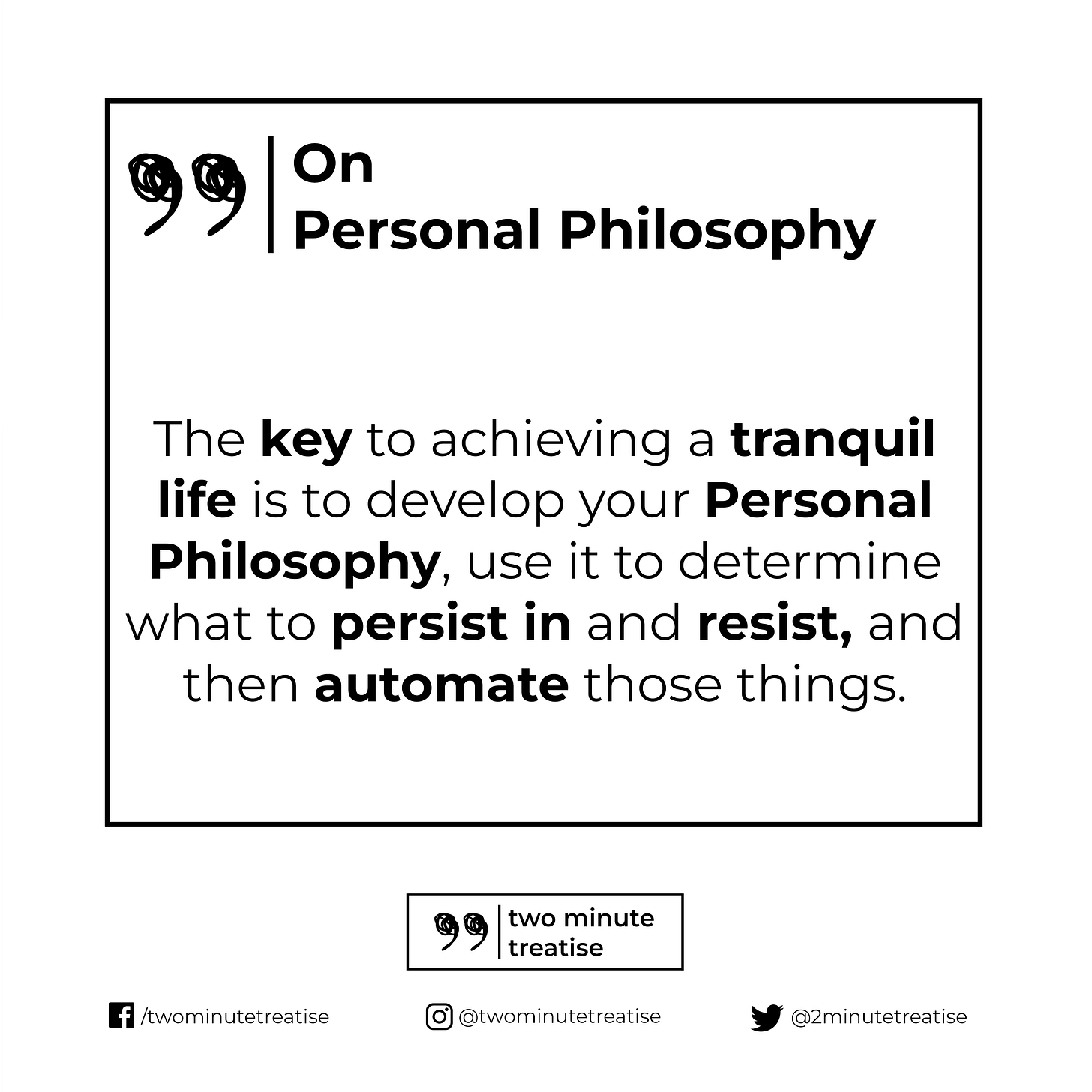
If anyone would take two words to heart and take pains to govern and watch over themselves by them, they will live an impeccable and immensely tranquil life. The two words are: persist and resist.
It is simple advice: persist in what is good, and resist what is bad. How can you have anything but tranquility when these principles guide you? There is no worry— just persisting and resisting.
But how do these words stack up against experienced reality? It’s much harder to persist in the good when you are surrounded by the bad, or when you are not sure what is truly good. This is why having a Personal Philosophy is so important. More than any external philosophy, it will give you the virtues and values that allow you to determine the areas of your life in which you should persist or resist.
These treatises have served a dual purpose for me: externalizing thoughts about topics that are important to me and clarifying my Personal Philosophy. Each nuanced look at a topic has helped me to better define the things that I believe, as well as the things I reject. What I should persist in and what I should resist.
If your values are relegated to autopilot, you will never be the kind of person you would like to be. You will constantly be fighting against the clock, letting people take advantage of you, and finding discontent. This tendency for autopilot results in the perpetuation of destructive systems. The values and systems of previous generations are inherited by the next, often with little thought. When was the last time you critically explored your priorities, your religion, your politics, your parenting style, your role in the relationships in your life?
This norm of inheritance seems to be being disrupted by Millennials and Gen Z as they take the reins from previous generations. Thanks to the ease of access to new information via the internet, these connected generations are able to readily find and consume information that helps to refine their Personal Philosophies. This allows them to take more agency over their values and resist what is of no benefit. If it can’t pass the smell test, it must go.
This does not mean that their values are inherently correct, but their process for developing those values should be affirmed and emulated. Nothing should be held in such high regard that it is safe from a critical fine-toothed comb. If you believe something to be the truth, you should be able to explain why that is. If you can’t, let this be the message that instigates that self-examination.
The process for developing a Personal Philosophy is not an easy one; often, it involves shedding aspects of your being that you would previously have viewed as essential. Any shift in identity naturally causes grief, which deserves to be fully felt. But on the other side of that grief is truth— your truth.
Part of my Personal Philosophy is the belief that everyone’s individual truth is part of the greater Truth of the universe. The logos, as Marcus Aurelius would put it— the driving force that interconnects us to each other, to the Earth below us and to the sky above. These, then, are the things to persist in: kindness, community, helpfulness, justice, peace. To resist? Those are overindulgence, selfishness, revenge, giving in to aggressive emotions.
The key, then, to achieving the coveted tranquil life that Epictetus mentions is to take a page out of the Millennial and Gen Z playbook and seek out the information necessary to construct, or strengthen, your Personal Philosophy, determine what to persist in and what to resist, and develop actions and habits that allow those things to become automatic, displacing the careless autopilot from before.
Peace will follow.
Edited by Jeremy Harr and Abigail McKay Cherry
Thank you for reading Two Minute Treatise, a weekly essay newsletter focusing on one philosophical topic, two minutes at a time.
Thank you to the newsletter curation newsletter, The Sample, for recommending Two Minute Treatise. Learn more.
First time reading? Subscribe here and view the archive.




There is not much that I understand or have knowledge about when it comes to Millennials and Gen Z so perhaps this is a premature comment however, I can't imagine adapting any values that I am familiar with from these two groups. Maybe it's time to learn more about the philosophy of Millennials and Gen Z.